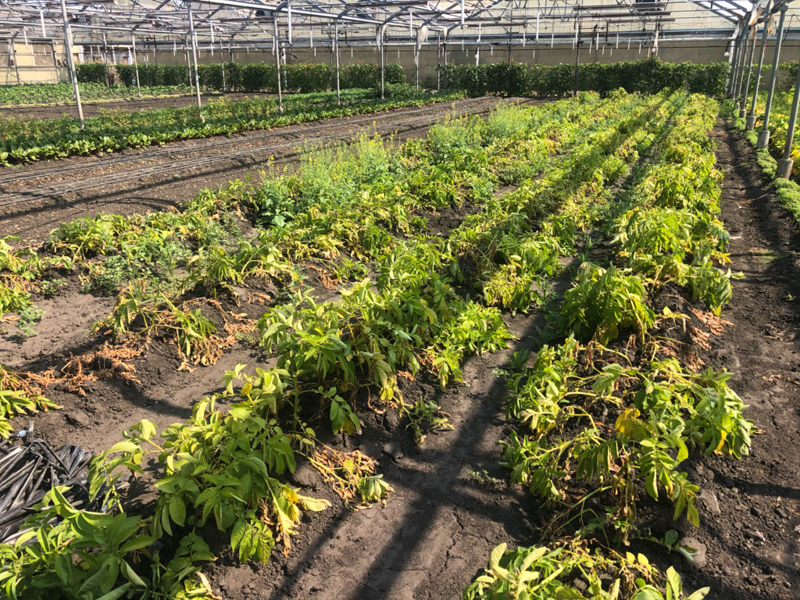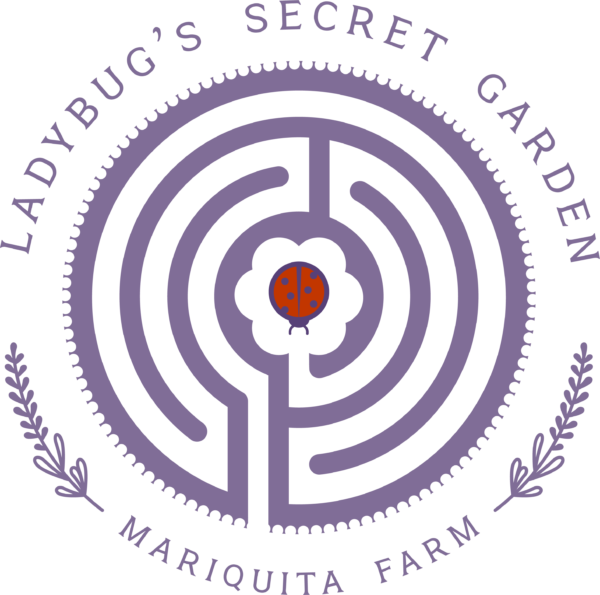Potatoes and the web

The potatoes in this week’s share box are “new” potatoes; that is, they have been dug from beneath green plants that are only just beginning to wilt down. As such, these very fresh potatoes will not store for a long time the way that a cured potato can. But do they ever taste good! They should be kept in the refrigerator until you use them so that they do not wilt. Be aware, too, that they will cook much faster than a “regular” potato, so adjust your preparation times accordingly. I have a few more things to say about potatoes today but I have been encouraged by Shelley and my partner, Starr, to say a few words about technology.
No, I don’t know much about technology, and I don’t have much that is meaningful to say, but…..
This has been a very challenging year for our business and 2020 promises to continue to be weird and unpredictable all the way up until the ball drops on TV at 11:59 PM Eastern Standard TIme on December 31st. We’ve been muddling through, but even the potatoes in this week’s box speak to the difficulties we’ve been working through. When the Covid crisis announced itself to American civic life in early March one of the first consequences was financial chaos. For a while we had no monies on hand to buy seeds the way we usually would, and I was unable to source the certified disease-free seed potatoes the way we usually do.
We’re getting to the “technology” but….
Potatoes are underground stems, not roots, and potato plants are not typically started from seeds, but from pieces of potatoes that have viable “eyes” or buds that will develop new plants. Since potatoes can pick up viruses from the soil that affect production it’s a good idea to source the potatoes that will be cut into sections for planting from companies that specialize in disease free planting stock. Insects are a common vector for potato viruses so these farms are usually located in places like Oregon or Idaho where freezing wintertime temperatures keep insect pressure to a minimum. Good certified disease free potato ground is also often highly mineral- perhaps volcanic in origin- because these soils are less hospitable for the viral pathogens that affect potatoes.
“Viruses” affect computer systems too….
Anyway, I couldn’t source the disease free seed potatoes that I wanted when I wanted them. I decided to use the last few cull potatoes we had on hand – the little weird ones that were too ugly to sell, the ones that had been damaged by the shovel or had a sun scald burn on one side, or where a beetle had chewed a hole in the side. So we couldn’t hope for a big crop, but I figured we’d get by. However, the website we had been using to support our business was very out of date and after turning the issue over in our minds we decided we couldn’t get by with it indefinitely. With all the unquantifiable variables and insecurities and opportunities alive in the business and growing environment we had to make a decision to go forward and invest in new platforms that would help us keep growing and selling and delivering- or quit. So we decided to go for it, and we’re now rolling out the new website and e-commerce platform this week. We’re hoping we’ll be better able to handle transactions in a transparent and more reliable fashion than before. The labor of entering all the info that our old system required was unsustainable. We strive to be a model of “sustainable” agriculture, but if we can’t sustain ourselves we can’t care for the soil.
The reflection I went through when deciding to go ahead with getting a new website reminded me that sometimes I get sick of farming and quit. The last time I quit was in the winter of 1990 after a severe cold front in December ’89 destroyed all of the crops we’d planted to survive on during the winter. I took a trip to Bolivia to look at the cactus forests in the red-rock desert country of the Tarija Department, down near the frontera with Argentina. I found myself staying in the little mountain town of Tupiza and venturing out into the deserts to look for cacti. One afternoon, after a long hike and after having been rained on and then baked by the sun I was dragging my tail feathers into town, sore-footed, and still a few blocks from the little room I was staying in when I heard children laughing at me.
I turned and saw three girls, about 13 years old, dressed in the uniforms of the Catholic school they attended. They squealed and ran down a side alley. Since I’m so tall and white and looked so strangely out of place I was used to people staring and commenting. I kept plodding along. Then the girls suddenly popped out onto the sidewalk in front of me, and the boldest girl made to block my path.
“Are you German?” she demanded to know.
“Good afternoon, Senoritas,” I responded. “No, I’m not German. I’m a Californian.”
The girls went into a huddle without getting out of my way. The bold one again addressed me, a bit more diplomatically.
“We have to do a report for civics on foreigners, and we were going to do it on Germans, but since you’re here we will interview you instead.”
“What would you like to know?” I asked.
“You can make yourself presentable and come to my house at 5pm,” she said, “and we will interview you.” She gave me her address, and with that the girls raced off.
I cleaned up, then showed up. I knocked on the door of a little cinder-block house, quite respectable but humble in it’s out door appearance, and was seated in the living room. There was a figurine of the Virgin on a shelf, a portrait of the Pope on the wall and a crucifix, and a small TV on a bureau. Against one wall was a couch where two of the girls were seated, and there was an armchair with the third. And in the middle of the room, dominating the room the way Mt Shasta dominates northern California, or Fuji dominates Japan, was an immense multicolored pile of potatoes. I was served tea and cookies, and the girls got right down to business.
“Are you married?” “Where’s your wife?” “How old are you?” “How much money do you make?” “Are you Catholic?” “Do you have any children?”
“Senoritas,” I pleaded. “One at a time. No, I’m not married?”
“Why not?”
“I have not yet found the right woman.”
“But you’re looking, right? How old are you?”
“I am 30. When I find the right woman, and I’m making a reasonable income and have some degree of security in my life, then maybe I can start a family.”
“What do you do for a living?”
“I’m a farmer.”
“?????!!!!!!”
The girls could handle the fact that I was unmarried, 30, and not Catholic. They could believe that I’d travel halfway around the world to look at cacti, and they were even willing to accept that I was not German. But they did not buy the idea that I was a farmer. Their fathers were farmers. Their fathers got up every morning before dawn as their fathers had done before them, and they went to their little plots of ground where they grew potatoes. They didn’t travel. They grew many varieties of potato as insurance because some years one kind would do better, and other years favored a different kind. And when the harvests came in they dug the potatoes by hand and stored them in the house so that their crop would be safe for thieves and rodents and insects and cold temperatures. With their year’s food supply assured, they’d sell their excess harvest in the Tupiza farmers market. Farmers don’t travel.
“But I am a farmer,” I said. And I told them about the crops I cultivate them and how and where I sell them. The girls weren’t going to tell me I was lying, but they weren’t convinced. After another huddle they arrived at a solution. “You are an ingeniero agronomo,” they declared. “That’s why you know about growing but get to travel and are not rooted to the soil like a potato.”
With the issue of my suspicious livelihood out of the way they were able to get back on track for an in-depth exploration of my religion, or lack there-of, my family, or lack there-of, and my income, or lack thereof. When they were finished taking notes I was on my way. They were lovely girls; charming, direct, funny, and sincere, and my encounter with them was one of the more enjoyable visits I’ve ever had with anybody. Today I wonder what they’re up to now and I ask myself how far technology has made itself at home in Tupiza. There was that TV in the living room, after all, so maybe the three girls grew up to manage their family farms’ on-line sales platforms. Who knows; maybe one of the three grew up to be a high-tech sorceress here in Silicon Babylon? We’re nothing, if not a diverse society of doers and makers, and technology is just as important down in the earth of the potato patch as it is atop the highest skyscraper where the tech wizards eat the potatoes we grow. We look forward to your feed-back as we go about our business of trying to feed you.
© 2020 Essay and photo by Andy Griffin.


